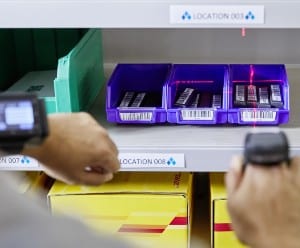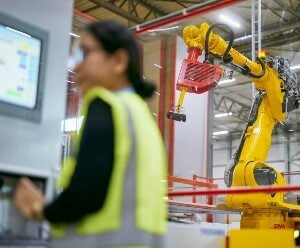
How a simple web application is tackling labor shortages in the warehouse

A host of issues may force warehouse operations to slow down or grind to a halt, but perhaps the most disruptive of all is dealing with a shortage of warehouse employees.
In times of higher demand, this creates logjams that are tough to break, much less recover from. For businesses, that means both time and resources are wasted.
With their first-hand insights into the intricacies of warehousing logistics, a four-member team from DHL Supply Chain set out to put an end to this age-old industry problem.
Through Deutsche Post DHL Group’s (DPDHL Group) intrapreneurship program Start-up Lab, where employees pitch new logistics-related business ideas to secure funding and resources, the team’s web application Labor Share App was born.
In line with the Group’s push for digitalization as part of Strategy 2025, the team’s idea enables higher productivity and better resource optimization in warehouses through the use of technology. With the web application, DHL’s warehouse operations personnel can easily facilitate the sharing of manpower among the company’s facilities where there are surges in demand.
“The application’s centralized database can provide visibility to support an expedited and standardized decision-making process to allocate DHL resources where needed,” explained Murilo Pachioni, Global Labor Share App Program Lead.
Rolled out by the team remotely in the thick of the pandemic last April, the application has since been piloted in five countries, namely Mexico, Brazil, Thailand, Slovakia and Chile.
Building the app
The team’s journey began when its four Brazilian members, who work for DHL Supply Chain in Germany and Spain, came together to enter the Start-up Lab program with their nascent idea.
Inspired by the sharing economy, the application offers the options to provide or request labor, before the algorithm matches them to the right party based on demand. Users have full visibility and control with management workflows and reports captured in the web-based application, which will eventually be available on mobile.
“Technology greatly simplifies and reduces the scale of the labor shortage problem. Not only does our application maximize productivity in our operations, it also enhances the employee experience with better work distribution, which allows us to deliver a seamless uninterrupted customer experience during all seasons,” said Pachioni.
What followed after joining the intrapreneurship program was 20 months of pitching, planning, building, and eventually implementing the proof of concept across the different regions to secure funding for the project.
Pachioni and his team have been heavily involved in their respective areas of expertise from the conceptualization stage, including project management, finance, solutions design and operations management, to get the application up and running.
While the project was exciting, stepping into a start-up environment required a change in mindset for the team, admitted Pachioni. “We had to learn how to work in a completely different way from what we were used to, like entrepreneurs building a new product.”
With guidance from Start-up Lab, the team navigated the tedious processes to establish their web application. This included finding the right app developer, designing the app rules, pursuing and gaining information access, and building the business case to share resources globally.
Staying resilient against Covid-19
In the lead-up to the launch last April, the Covid-19 pandemic threatened to derail their plans. Worldwide lockdowns and restrictions delayed critical discussions and meetings with key stakeholders including service providers and decision-makers.
But it turned out to be a blessing in disguise, as the team forged ahead and launched the app remotely while under lockdown in their respective countries.
“The pandemic made it tougher for us, but it also provided a realistic testbed to evaluate the feasibility and functionality of our application. Due to an unprecedented demand fluctuation and volume concentration from our clients’ operations, there was a need for clear visibility over the surplus or shortage of manpower to keep their business running,” said Pachioni.
The crisis highlighted the importance of using a tool like the Labor Share App to build a resilient logistics network with the flexibility and responsiveness to adapt quickly to urgent situations.
“The Labor Share app truly enables the maximization of our labor force. With the envisioned linking to our time-tracking and order management systems, it will reduce further administration and gives us more visibility on the created opportunities,” said Kevin Burrell, CEO, DHL Supply Chain Thailand Cluster.
Only nine months have passed since the launch, but the application has already achieved notable success. Analytics show that it has processed up to 250,000 hours of labor shared between 97 different worksites — the equivalent of reallocating around 90 DHL employees every day.
Particularly in Brazil, one of the pilot countries, the operations team has been reaping the benefits of the Labor Share App.
“The application was launched in Brazil last year during the pandemic, when the volume fluctuations were higher than in previous years. The process simplification and control improvements from sharing resources between operations was significantly positive,” said João Prada, Operations Director, DHL Supply Chain Brazil.
“The leadership on the operations floor was able to exchange information in a simple, timely manner that helped in increasing the shared labor hours by 20 percent, bringing cost reductions and delivering value for our customers,” he added.
Effecting change
With the pandemic showing no signs of abating, the Labor Share App team is aware that its work is far from done.
They are preparing their foray into new markets such as Colombia, while making application improvements and integration with other systems in the five existing pilot countries.
“We’ve almost fully implemented the application in the Latin America region and we plan to start a trial within the first quarter of 2021 in UK and Ireland,” shared Pachioni on the team’s progress. “For Asia Pacific, we’re discussing the roll-out for nine more countries this year. Likewise, in Mainland Europe, Middle East, and Africa, we will expand the scope to engage more countries.”
Although solving the labor shortage issue in warehouses remains the primary goal, the team derives motivation from a greater purpose: fostering a culture of sharing and collaboration — which they continue to believe is essential to enabling the full potential of the Labor Share App.
The success of allocating and sharing resources between different facilities during the pandemic only gives a taste of the massive potential of nurturing a collaborative mindset among employees, added Pachioni.
The team has bolder plans for the coming years. “Our vision is to inculcate the right mindset and implement the right tools to make the sharing of every shareable resource a reality within the company.”
ALSO WORTH READING














 English
English